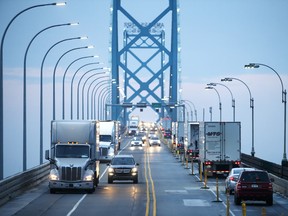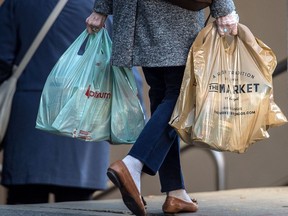All major parties campaigned on promises of billions in new spending, continued deficits
Article content
Canadians are projected to have voted for the status quo, returning Prime Minister Justin Trudeau’s Liberal Party to a minority government, but the lasting impact of the election may be the more permissive attitude toward looser fiscal policy.
Advertisement
This advertisement has not loaded yet, but your article continues below.
Article content
“The most significant development from an economic perspective during the election campaign was the broad tilt to increased fiscal spending proposed by almost all major parties,” wrote BMO Financial Group chief economist Douglas Porter in a Tuesday note to clients.
The Liberal Party is leading or elected in 158 ridings, followed by the Conservative Party in 119, the Bloc Quebecois in 34 and the New Democratic Party in 25. Mail ballots are still to be counted, meaning the final seat count could change, but no party appears to have gained or lost more than two seats.

All three major parties campaigned on running continued deficits for the next five years and introducing billions of dollars in new spending. The Liberals promised to spend $78 billion between 2021 and 2026 on health care, subsidized child care and climate commitments, among other promises, which would be partially offset by an increase in revenues of $25 billion.
Advertisement
This advertisement has not loaded yet, but your article continues below.
Article content
The party promised to reduce the deficit from $156.9 billion in fiscal year 2021-22 and to $32.1 billion by fiscal year 2025-26.
The Parliamentary Budget Officer had upgraded its projections of Canada’s GDP growth in August, and also adjusted the baseline to a $138.2-billion shortfall for 2021-22. The Liberals revised the deficit back up due to new campaign priorities.
“Looking at the big picture, this election could be a sign that loose fiscal policy is here to stay,” wrote Capital Economics senior Canadian economist Stephen Brown.
The Liberals will need to lean on other parties to get legislation passed, Porter said, and the NDP — which proposed $200-billion in new spending in its costed platform — is the “most likely dance partner,” given the two parties’ common cause on several issues.
Advertisement
This advertisement has not loaded yet, but your article continues below.
Article content

Indeed, said TD Economics economists Sri Thanabalasingam and Rishi Sondhi in a note to clients, “the minority government’s overall agenda could be shaped to attract opposition support. This dynamic could generate greater spending and deficit outcomes relative to the Liberal status-quo platform proposal.”
The economists expect housing to be a key area of policy development for the incoming government, given the cross-party support for addressing housing affordability. Thanabalasingam and Sondhi also flagged continued COVID-19 supports, employment insurance reform and health-care funding as areas likely to benefit from greater policy action.
While the Liberals’ promised spending could boost GDP growth in 2022 and 2023, the TD economists said there could be a “small fiscal drag” in 2024 as stimulus wanes.
Advertisement
This advertisement has not loaded yet, but your article continues below.
Article content
The Canadian Federation of Independent Business president and chief executive officer Dan Kelly called on Twitter for the federal government to extend the wage and rent subsidy “immediately,” return the maximum supports to 75 per cent, include businesses that opened after March 2020 in the supports, and move on the Liberal promise to extend the Canada Recovery Hiring Program through to the end of March 2022.
“Passports and other COVID restrictions are mounting once again, limiting prospects for a small biz recovery,” Kelly wrote. “Many businesses (are) reporting a further drop in sales just as the feds are phasing out the rent and wage subsidy.”
No party can claim to have won a convincing mandate
Goldy Hyder, chief executive, Business Council of Canada
Kelly also called on the government to support small businesses that have to enforce proof of vaccination. Part of the Liberals’ promised $1-billion provincial vaccine passport launch fund should be put toward the staffing and technology small business owners will need, he said.
Advertisement
This advertisement has not loaded yet, but your article continues below.
Article content
Business Council of Canada chief executive officer Goldy Hyder called on all parties to “put partisan interests aside and focus on what is best for Canadians,” noting that “no party can claim to have won a convincing mandate.”
The first priority, Hyder said, to safely restart the economy and address challenges that existed pre-pandemic, including an aging population, inequality, Indigenous reconciliation, climate change, geopolitical tension and public debt.
Investors showed “little reaction” to the election in overnight markets, TD economists wrote.

Posthaste: The new minority Trudeau government must get to work on these five economic issues — immediately

Banking industry may be clearest loser from Trudeau’s re-election

David Rosenberg says Trudeau’s win puts capitalists in ‘penalty box’

This minority government’s climate-change agenda should worry investors
Advertisement
This advertisement has not loaded yet, but your article continues below.
Article content
Canada’s main stock index was on track for its best day in two months, trading 0.5 per cent higher amid a broader rebound in global markets. The loonie was virtually flat at 78.06 cents against the U.S. dollar after trading up on Tuesday morning. The Canadian dollar had been trading lower in recent weeks due to uncertainty around the election.
“We continue to see modest upside for the currency over the next year, as the economic recovery progresses and the Bank of Canada lifts interest rates somewhat ahead of the Federal Reserve,” BMO’s Porter said. “Suffice it to say that, with so many major global cross currents right now, this stable election result is well down the list of factors impacting the loonie.”
Financial Post
• Email: krolfe@postmedia.com | Twitter: kelseyarolfe
Advertisement
This advertisement has not loaded yet, but your article continues below.
Looser fiscal policy on the way if Liberals are to woo ‘likely dance partner’ NDP
2021-09-21 19:27:37






